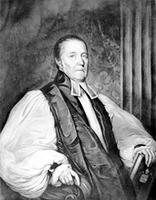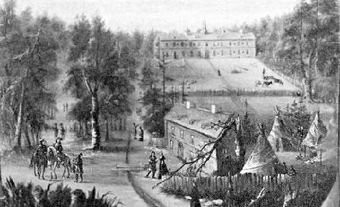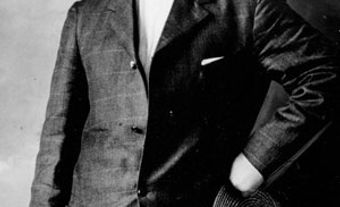
John Strachan
John Strachan, religious leader, teacher (b at Aberdeen, Scot, 12 Apr 1778; d at Toronto 1 Nov 1867). Reverend John Strachan was the chaplain of the garrison at YORK during the WAR OF 1812. Smart, courageous, and stern, he confronted and negotiated with the Americans, whose conduct and actions he detested after their attack on York in 1813.Strachan lost his father when he was 14. He entered the University of Aberdeen at only 16 and supported his widowed mother through teaching. He was offered a lucrative position in UPPER CANADA running a new academy, but upon his arrival in 1799, found that the scheme had died and he was jobless in a new country, with only 20 shillings to his name.
Too tough to quit, Strachan soon established himself as a tutor and educator in Kingston. With few clergymen in Upper Canada, Strachan chose to take the orders of the Anglican Church. He was ordained by the first bishop of Québec in 1803 and served in Cornwall, where he established a first-class grammar school. He received a doctorate of divinity in 1811 and was appointed to the rectory in York as war loomed on the horizon.
Strachan in the War of 1812
When the War of 1812 began, Strachan became an ardent British supporter and made populist speeches on Britain's early success at Detroit. His sermon of November 1812 praised the regulars, but especially the militia: "And never, surely, was greater activity shewen [sic] in any country than our militia has exhibited, never greater valour, cooler resolution and more approved conduct; they have emulated the choicest veterans, and they have twice saved the country." Such exaggerations were key to the myth that it was Canada's militia, not its expensive professional soldiers, who won the War of 1812. It was a popular, and false, sentiment.
As rector of York, Strachan witnessed the American invasion of his city in April 1813, and being an amateur scholar of war, proceeded to analyze the battle. His conclusion was that the local commander, Major General Roger Hale SHEAFFE, was as responsible for the debacle as were the Americans. In a report of the battle written by Strachan and his fellows, they noted that the only way to save Upper Canada was to bring in more troops and replace Sheaffe, since he had "lost entirely the confidence of the regulars and militia . . . ."
The Surrender of York
But Strachan was not just a man of words, but one of conviction, courage, and action. He took a personal role in the final surrender of York, negotiating directly with the Americans despite having no official diplomatic authority. The surrender had been delayed by the Americans, and Strachan accused American naval commander Isaac Chauncey, to his face, of stalling to allow for looting, pillaging and destruction. Strachan eventually negotiated the return of the stolen materials.
Post-War Life
With the war over, Strachan returned to his role as the city's religious leader and pursued the development of provincial education. He eventually became the first bishop of Toronto. He was appointed to the executive council of Upper Canada in 1813 for "his zealous and valuable services during the late war." As a war commentator, he praised Major General BROCK for his intuition and zeal, and criticized Governor General George PREVOST for his defensive mindset, especially later in the war. Strachan's own war conduct was never forgotten by the people of Upper Canada, who found in him a tough and educated leader when they needed it most.

 Share on Facebook
Share on Facebook Share on X
Share on X Share by Email
Share by Email Share on Google Classroom
Share on Google Classroom


